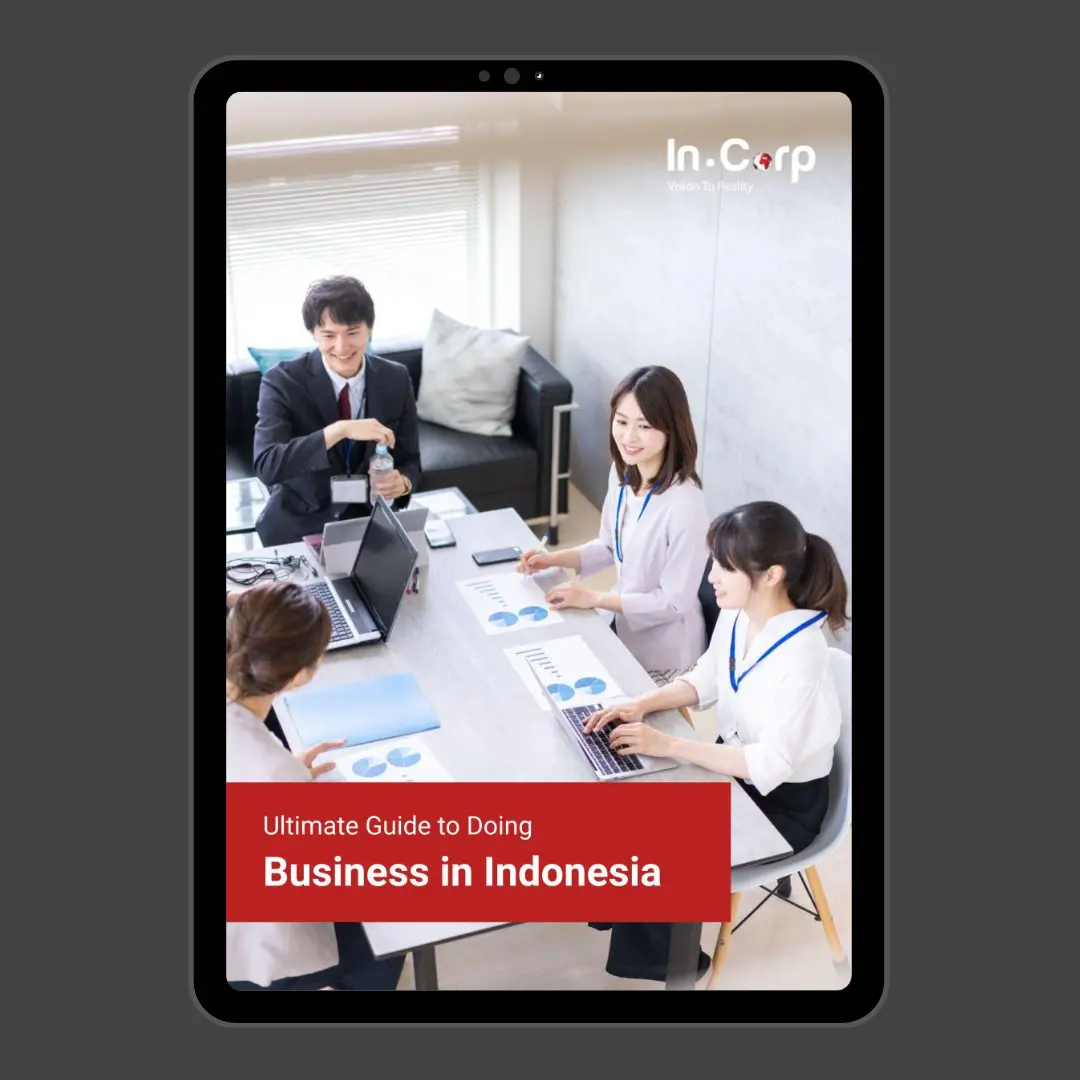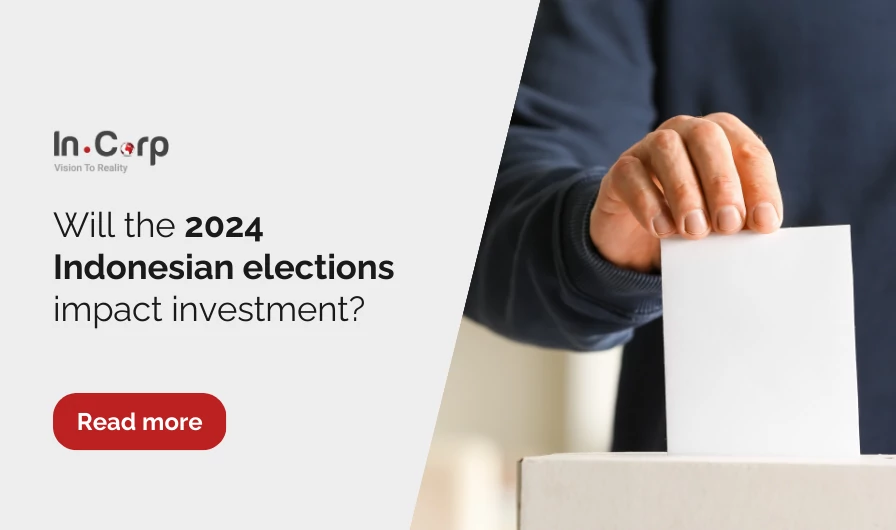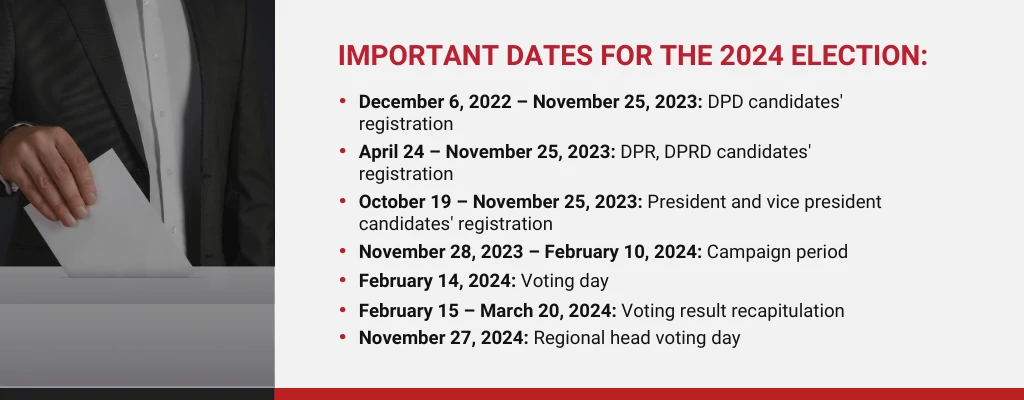With the upcoming Indonesian election in 2024, businesses across the country are paying close attention to its potential impact. This article examines whether these important political events will noticeably influence business opportunities and investments in Indonesia.
Insight into the 2024 Indonesian election
Indonesia’s political landscape will undergo a significant transformation as 2024 approaches. The country is gearing up for an unprecedented dual election, merging the general election (Pemilu) and regional head election (Pilkada) into one event.
Scheduled for February 14, 2024, the Pemilu will encompass crucial elections, including:
- Selection of the President and Vice President
- Voting for Members of the House of Representatives (DPR)
- Choosing representatives for the Regional Representative Council (DPD)
- Electing members of the Regional People’s Representative Councils (DPRD) at the provincial and regency/city levels
- On November 27, 2024, the Pilkada will take place, aiming to elect governors, deputy governors, regents, deputy regents, mayors, and deputy mayors across Indonesia.
What’s different about the Indonesian election in 2024?
Unlike the previous two-term presidential elections in 2014 and 2019, the upcoming Indonesian presidential election might feature three potential candidates: Prabowo Subianto, Ganjar Pranowo, and Anies Baswedan.
Prabowo Subianto currently serves as the Minister of Defence and heads the Great Indonesia Movement Party (Gerindra), gaining significant backing from Gerindra and the National Awakening Party (PKB).
Ganjar Pranowo, the current Governor of Central Java, is primarily supported by the Indonesian Democratic Party of Struggle (PDIP) and the United Development Party (PPP).
Additionally, Anies Baswedan, the former Governor of Jakarta, enjoys support from the National Democratic Party (NasDem), the Democratic Party (Demokrat), and the Prosperous Justice Party (PKS).
The official candidates will be confirmed after completing the registration process on November 25, 2023.
A familiar trend in elections influencing business
During election periods, businesses often face uncertainty, affecting investment progress within the country. Economic analyst Faisal Basri suggested that it’s reasonable for investments to stall during elections. This trend can be observed in past elections.
For instance, during the 2009 election, investment saw a modest growth of 3.3% from a baseline of 10%. Similarly, in the 2014 election, investment increased by 4.6% compared to the previous year’s 4.4%. The 2019 election saw investment growth drop from 7% to 4.5%.
Despite this potential challenge, the Indonesian government remains hopeful that investment will persist throughout the political year of 2024.
Read more: 15 strategies for global business expansion in Indonesia
The history of Indonesian elections
Indonesia, a prominent democratic nation, has effectively conducted five direct presidential elections. This history showcases the country’s skill in upholding stability during elections, offering investors confidence in security and safety throughout the voting process.
Although the Indonesian government is positive about the investment outlook in 2024, investors may raise concerns about the future of President Joko Widodo’s accomplishments, including the creation of the Nusantara Capital City (IKN).
Navigating the investment landscape
Febrio Kacaribu, the Head of the Fiscal Policy Agency (BKF) at the Finance Ministry, is hopeful that investment will continue to thrive during the 2024 election.
This optimism is fueled by Indonesia’s strong economic performance and reliable investment governance, which attract investors.
Economically, the upcoming general election could lead to a notable rise in consumption due to the engagement of millions of people in various activities, such as the sale of campaign materials.
In addition, Indonesia’s currency exchange rate is rising while other nations experience currency depreciation. Notably, Indonesia holds the fourth position among the top 10 IPO markets in the first quarter of 2023, according to data from Global IPO Watch QI 2023.
This achievement is linked to the increased demand for electric vehicle battery production commodities.
Likewise, Mahendra Siregar, the Chairman of the Financial Services Authority (OJK), reassures that the investment climate will remain favorable in 2024.
The effect of Indonesian elections on IKN’s progress
President Joko Widodo has emphasized that the Nusantara Capital City Law (UU IKN), passed in 2022, guarantees that the project will persist despite a change in the country’s leadership in 2024.
The president has taken steps to provide financial incentives for IKN, totaling USD 2.6 billion, encompassing three hundred investment packages. These funds are earmarked for the private sector, mainly focusing on housing, transportation, energy, and technology.
Likewise, other ruling coalition members have pledged to incorporate the IKN project into the nation’s long-term development plan, ensuring the ongoing legacy of this initiative.
IKN holds significant potential for new and renewable energy sources, boasting approximately 434,000 megawatts and 434 gigawatts, including geothermal, wind, solar, and hydropower.
Addressing population distribution, the president has highlighted that Indonesia ranks as the world’s fourth most populous country, indicating no challenges in populating a world-class city.
Unlocking the opportunities
With leadership changes, investors may need more time to determine conditions. Therefore, businesses should adopt precautionary steps before finalizing investment choices during elections.
Focus on the outcome
The likely scenario suggests that election day won’t impact market performance. Regardless of the election result, a new administration will unlikely significantly alter the economy or heavily devalue the currency.
Avoid predicting the future
The future is still being determined; instead, aim for long-term growth opportunities while accepting that a perfect scenario is hard to achieve.
History shows that investors have succeeded by holding onto investments during presidential changes rather than picking based on preferred party.
Make informed choices
It’s crucial to steer clear of current election worries to avoid significant, lasting changes to your investment approach.
Guide to Doing Business in Jakarta

Conclusion
Indonesia will experience the first-ever combined presidential, legislative, and regional heads’ election in 2024. This unique situation could slow down investment due to the uncertainty of the political climate.
However, the government remains confident that investment progress will persist, driven by strong economic performance and trustworthy investment practices that attract investors to the country.
Businesses can partner with InCorp Indonesia to maximize the opportunities in this election year. Our offerings include services such as Investor KITAS and company registration, ensuring a seamless entry into the Indonesian market. For additional details, contact our consultants by clicking the button below.




